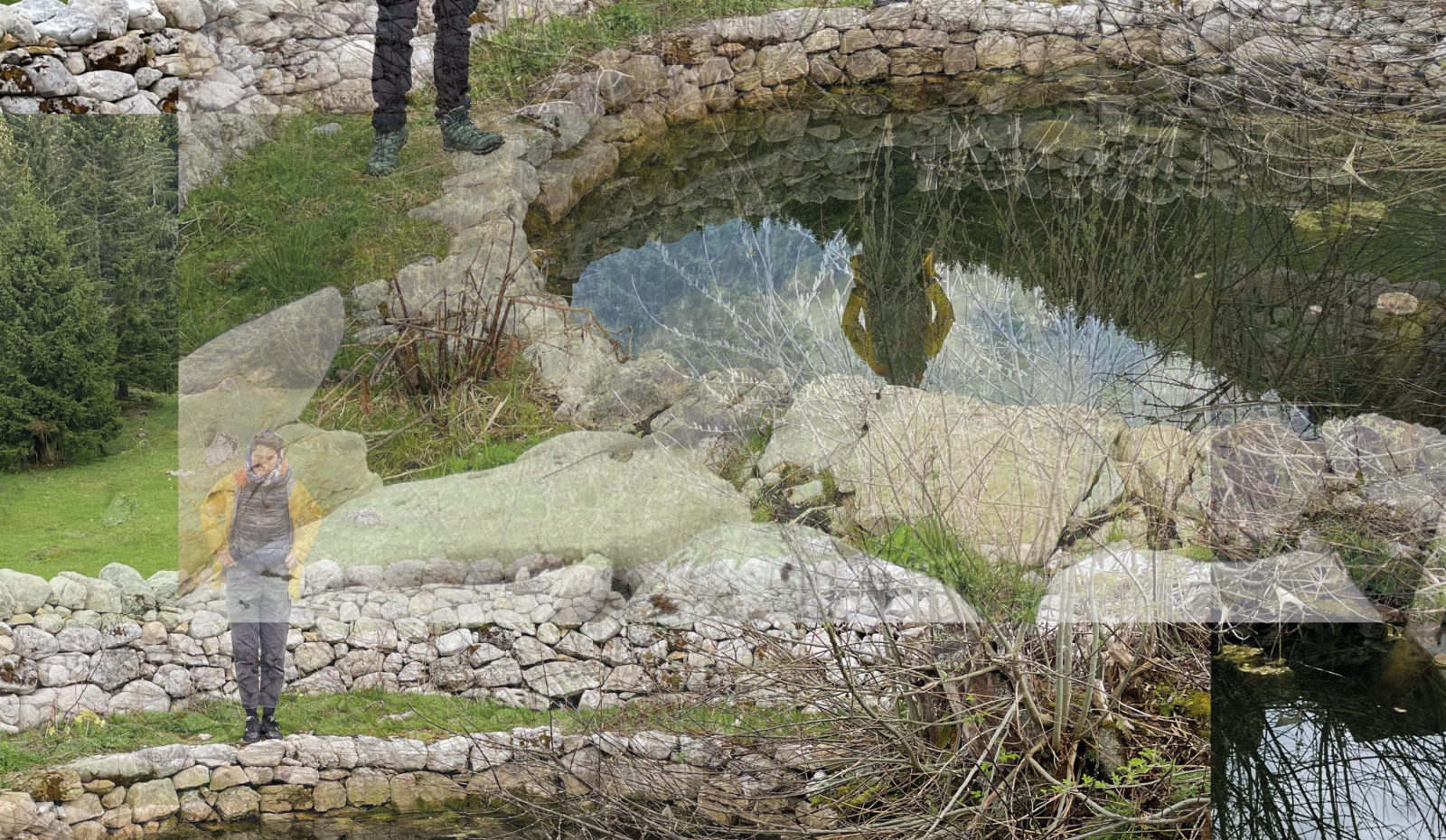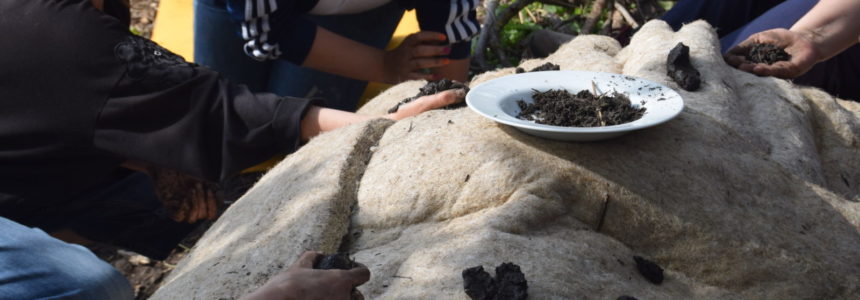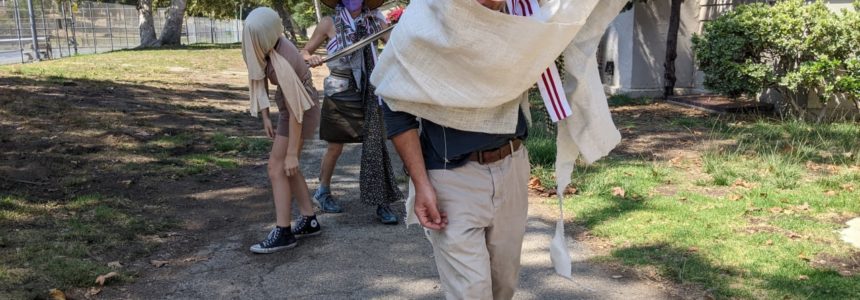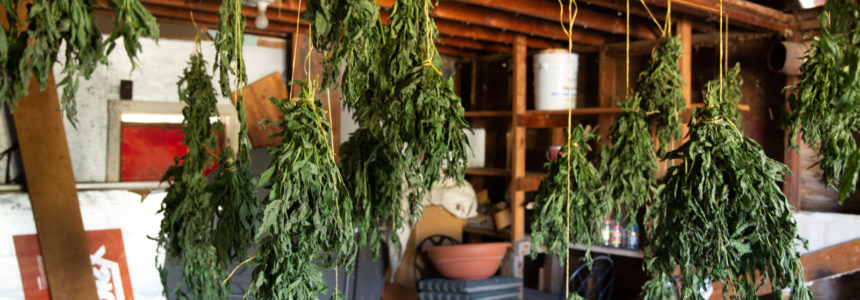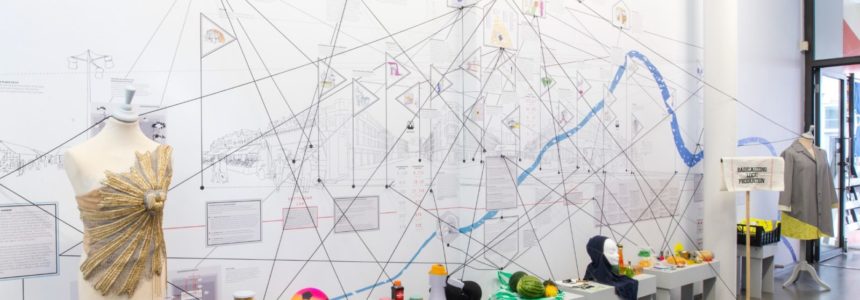ISSUE #20 – Ecopedagogies
Introduction
This issue brings together a series of articles focusing on the notion of ecopedagogy, a term that, since March 2023, we have placed at the heart of a research project entitled Faire éco. Co-créations artistiques en milieu scolaire pour expérimenter une écopédagogie (‘Faire éco. Artistic co-creations in schools as a way to experiment with ecopedagogy’)1.
The notion of ecopedagogy is based on the conviction that, while education alone cannot change the world, it is an essential tool for doing so. Ecopedagogy calls into question individual competition, oppressive relationships, and inequalities – just as the critical pedagogies to which it is moored always have. At the same time, falling within the multiform critique of exploitation opened up by ecofeminism2, ecopedagogy takes on the myth of perpetual growth, neoliberal globalisation, overproduction, and extractivism. The literature of ecopedagogy shows us that such a pedagogy is intended to be considered in an intersectional way, i.e. by taking into account the different injustices and biases that shape our relationship with the environment3. Consequently, there can be no ecopedagogy without a decolonial approach, which understands the origins of the current ecological disaster with regard to coloniality4.
Ecopedagogy places the question of the human/environment relationship at the heart of the learning experience and seeks to move away from a strictly anthropocentric vision to encourage sustainable changes in our lifestyles. For Antonia Darder, a specialist in critical pedagogies, ‘It is not enough to rely solely on abstract cognitive processes, where only the analysis of words and texts are privileged in the construction of knowledge’, because ‘[s]uch an educational process of estrangement functions to alienate and isolate studentsfrom the natural world around them, from themselves, and one another. This, unwittingly, serves to reinforcean anthropocentric reading of the world, which denies and disregards the wisdom and knowledge outside Western formulations’5.
To break this deadlock and encourage a global, sustainable, and profound ecological turnaround, we hypothesise that co-creative artistic practices can play a key role in the process of educating on ecology understood in the broadest sense. Because of its transdisciplinary nature and its ability to work on the emotions and the psyche (as shown by Félix Guattari6), art can be a privileged space for tackling ecology in all its complexity and inventing new ways of relating to the world7. In this way, the collective production of artistic forms is part of a research process, and feeds into the production of knowledge that incorporates the feelings and imaginations of those involved in such approaches.
The first phase of the Faire éco. Co-créations artistiques en milieu scolaire pour expérimenter une écopédagogie research programme included the organisation of Ecopedagogy, a series of talks, an online public meeting to facilitate discussions without geographical limitations, with seven artists and cultural workers taking part before writing the articles presented here.
Although they do not specifically use the term ‘ecopedagogy’ to talk about their practices, we asked the authors, for their contributions, to think about their practices in relation to this term. What these guests had in common is that they see artistic practice as a process that involves working with others, going beyond material artistic production to give priority to relationships, developing forms that could be described as ecosophical8 – an ecology combining environmental, social, and mental dimensions.
For the authors, the issues of sustainability or ecology – even when they are not addressed as a theme – are therefore at the heart of the ethical approach they are implementing by encouraging local, collective, and transformative approaches which go beyond the issues of representation. In this way, the authors offer us essential lines of enquiry for rethinking compulsory and higher education courses, including those at art schools, by assessing the climate emergency.
While ecopedagogy has its roots in Latin America (the concept originated in the 1990s, in the writings of Costa Rican Francisco Gutierrez and Brazilian Moacir Gadotti9), the term is increasingly present in the academic field in other regions, particularly the United States. In Europe, however, its use remains limited. Propositions for taking real action based on these ideas are rare, and it therefore seems difficult to translate ecopedagogy’s theoretical content and the imaginary ideas it conveys into concrete, situated ecopedagogical practices. Although many authors stress the vital role that art can play in encouraging action for the climate, there is little discussion of how this should be done. While we are presented with a proliferation of formats (mediation, creative workshops, etc.) and approaches, the tools for evaluating them in a qualitative way have yet to be conceptualised.
One of the aims of the present research is to fill this gap by seeking out and studying concrete examples of ecopedagogical actions involving artists (such as the examples presented here) and by carrying out three artistic co-creation projects between guest artists (three TRANS— Master alumni: Grace Denis, Aurélien Fontanet, and Lavinia Johnson), pupils in school classes, and their teachers10. At the end of the process, a forum-exhibition will present the co-creations made at LiveInYourHead11. The exhibition will also be conceived as a training ground for any teachers or educators wishing to develop similar practices.
microsillons (Marianne Guarino-Huet et Olivier Desvoignes), coordinators, TRANS— Master
Cover image: Study trip based on the principles of ecopedagogy, master TRANS–, Saint-Cergue, May 2022.
Notes
- Research supported by the HES-SO’s Design and Visual Arts Competence Network.
- See Isabelle Fremeaux, ‘Après la séparation : utopie et écopédagogie’, in I. Fremeaux, J.P. Berlan, T. Paquot, and J. Jordan (ed.), Des utopies réalisables, Geneva: A·Type éditions, 2013, p. 109-116; Émilie Hache, ‘Pour les écoféministes, destruction de la nature et oppression des femmes sont liées.’, Reporterre. Le quotidien de l’écologie, October 2016, available at https://reporterre.net/Emilie-Hache-Pour-les- ecofeministes-destruction-de-la-nature-et-oppression-des-femmes (last accessed 3.10.2023).
- Angela Antunes and Moacir Gadotti, ‘Ecopedagogy as the appropriate pedagogy to the Earth charter process’, in P.B. Corcoran (ed.), The Earth Charter in action: Toward a sustainable world, Amsterdam: KIT Publishers, 2005, p. 135-137; Richard Kahn, ‘From Education for Sustainable Development to Ecopedagogy: Sustaining Capitalism or Sustaining Life?’, Green Theory & Praxis: The Journal of Ecopedagogy, vol. 4, no. 1, June 2008, p. 1-14; Richard Kahn, Critical pedagogy, ecoliteracy, & planetary crisis: The ecopedagogy movement, New York: Peter Lang, 2010a; Richard Kahn, ‘Ecopedagogy: An Introduction’, Counterpoints, vol. 359, 2010b, p. 1-33; Ria Ann Dunkley, ‘Learning at eco-attractions: Exploring the bifurcation of nature and culture through experiential environmental education’, The Journal of Environmental Education, vol. 47, no. 3, 2016, p. 213-22; Irène Pereira, ‘L’éco-pédagogie: une conscience planétaire’, Le Courrier, 3.8.2018, available at https://lecourrier.ch/2018/08/03/leco-pedagogie-une-conscience-planetaire/ (last accessed 3.10.2023).
- Malcolm Ferdinand, ‘Pour une écologie décoloniale’, Revue Projet, no. 375, 2020, p. 52-56, available at https ://doi.org/10.3917/pro.375.0052 (last accessed 3.10.2023).
- In Kahn 2010a, op. cit., p. xv.
- Félix Guattari, Les trois écologies, Paris: Galilée, 1989.
- Bruno Latour talks about the importance of art in dealing with the feelings of anxiety that ecological changes provoke. See Latour, ‘Avec le réchauffement, le sol se dérobe sous nos pieds à tous’, Libération, 16.3.2018, available at https://www.liberation.fr/debats/2018/03/16/bruno-latour-avec-le-rechauffement-le-sol-se-derobe- sous-nos-pieds-a-tous_1636709/ (last accessed 3.10.2023).
- Ibid.
- Irène Pereira, op. cit.
- In conjunction with the Geneva Department of Education, these initiatives, led by Grace Denis, Lavinia Johnson, and Aurélien Fontanet, will take place throughout the 2023-24 school year.
- The exhibition is scheduled for autumn 2024.
